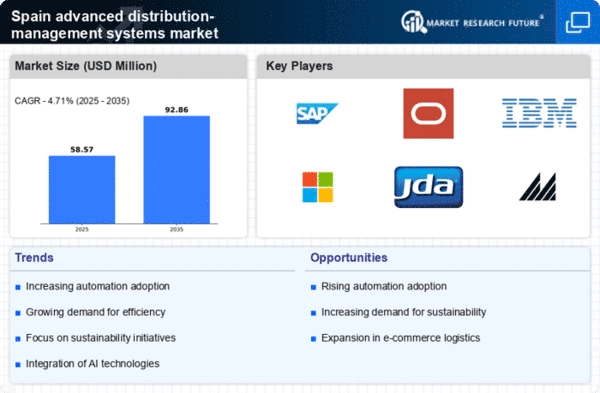Growing E-commerce Sector
The rapid growth of the e-commerce sector in Spain is a significant driver for the advanced distribution-management-systems market. With online retail sales projected to reach €30 billion by the end of 2025, businesses are increasingly seeking efficient distribution solutions to handle the surge in order volumes. Advanced distribution-management systems enable companies to streamline their logistics operations, ensuring timely deliveries and effective inventory management. The need for flexibility and scalability in distribution processes is paramount as consumer preferences shift towards online shopping. As a result, organizations are investing in advanced technologies that support omnichannel distribution strategies, thereby enhancing their ability to meet customer demands in a competitive landscape.
Focus on Cost Reduction Strategies
Cost reduction remains a primary focus for businesses in Spain, driving the adoption of advanced distribution-management systems. Companies are under constant pressure to minimize expenses while maintaining service quality. In 2025, it is estimated that organizations implementing these systems could achieve cost savings of up to 12% in their logistics operations. Advanced distribution-management systems provide tools for better inventory control, demand forecasting, and route optimization, all of which contribute to lowering operational costs. As businesses seek to enhance their profitability, the integration of these systems becomes increasingly vital. The ability to analyze and adjust distribution strategies in real-time allows companies to respond swiftly to market changes, ensuring sustained competitiveness.
Regulatory Compliance and Standards
the advanced distribution-management systems market in Spain is shaped by the need for compliance with various regulatory standards.. As the logistics sector faces increasing scrutiny regarding safety, environmental impact, and data protection, companies are compelled to adopt systems that ensure adherence to these regulations. In 2025, it is anticipated that compliance-related investments will account for approximately 10% of total logistics expenditures. Advanced distribution-management systems facilitate the tracking and reporting of compliance metrics, thereby reducing the risk of penalties and enhancing corporate reputation. Furthermore, as regulations evolve, businesses must remain agile and responsive, making the adoption of sophisticated distribution-management solutions essential for maintaining compliance and operational integrity.
Technological Advancements in Logistics
Technological advancements are significantly influencing the advanced distribution-management-systems market in Spain. Innovations such as artificial intelligence (AI), machine learning, and the Internet of Things (IoT) are transforming traditional logistics operations. In 2025, it is projected that the implementation of AI-driven analytics could enhance decision-making processes, leading to a potential 20% increase in operational efficiency. These technologies enable companies to automate routine tasks, predict demand fluctuations, and optimize routing for deliveries. As a result, businesses are increasingly investing in advanced distribution-management systems to leverage these technologies, thereby gaining a competitive edge in the market. The ability to analyze vast amounts of data in real-time allows for more informed strategic decisions, which is essential in today's fast-paced business environment.
Rising Demand for Supply Chain Efficiency
The advanced distribution-management-systems market in Spain is experiencing a notable surge in demand for enhanced supply chain efficiency. Companies are increasingly recognizing the importance of optimizing their distribution processes to reduce operational costs and improve service delivery. In 2025, it is estimated that organizations focusing on supply chain optimization could see a reduction in logistics costs by up to 15%. This trend is driven by the need for real-time visibility and control over inventory and distribution networks. As businesses strive to meet customer expectations for faster delivery times, the adoption of advanced distribution-management systems becomes crucial. The integration of these systems allows for better coordination among suppliers, distributors, and retailers, ultimately leading to improved customer satisfaction and loyalty.
















